Student entrepreneurs showcase their companies
By Mikhail Yakhnis

Ever discover that you’re out of milk right as you sit down to eat a bowl of cereal? Rosie, a new app by a company of the same name, aims to solve these and other grocery-related conundrums by reminding you when you are running low on various provisions and directing you to the cheapest source to replenish them. The app also lets you type in a keyword such as “BBQ” to bring up a list of items commonly associated with a barbeque such as chips, hamburger meat and buns.
Rosie, along with a handful of other student-run companies, made five-minute presentations of their ideas to an audience of students and faculty as part of Entrepreneurship@Cornell’s first annual eLab Demo Day April 18.
“eLab is five years old and growing fast,” said Dan Cohen, founding director of eLab. “We’ve had a lot of successful outcomes.” These include a company that had raised $400,000 from investors and another that was recently acquired by a larger company.
Cohen said two eLab teams applied to Start Up Labs – a competitive initiative that awards five startups $30,000 in seed capital and one of the five an additional $150,000 in capital. Startup Labs received applications from more than 100 startups before narrowing it to the five finalists. Two of the five finalists (Rosie and Yorango) including the grand prize winner, Rosie, were from Cornell. “We’re not just incubating the best concepts on campus; we’re incubating the best concepts in New York state,” Cohen said.
The companies themselves targeted a variety of industries, though most had a software component. Among the presenters that were not software-based was Marshfillows, a food company that infuses chocolate sections into standard marshmallows; when melted, the optimal s’more results. As the audience chuckled at the somewhat serious approach for a casual product, founder Miles Jordan Biggs joked: “Come on. This is serious stuff people.”
Other companies aimed to take their industries in new directions. Such is the case for Thinkplay, a new hardware/software suite that allows guitar players to create their own “virtual effects pedal,” allowing them to play any form of digital media through their guitar. Currently musicians have to buy effects pedals hardcoded with just one effect.
“I’m a guitar player; I have 12 of these effects pedals,” says co-founder Jesse Orshan. “And they are a pain to lug to a friend’s house, to a show, etc.” He says Thinkplay is the first company in history to allow users to play any digital audio clip on their instrument.
Some companies seek to integrate deeply with current systems. Building on the popularity of social media, Traffio aims to allow marketers to build interactive games on Facebook that in turn drive a referral loop that boosts online retailers’ conversion rates (the percentage of consumers who visit a site and buy something) by several percentage points over traditional online marketing.
Five other companies presented at demo day: Yorango, which seeks to build a new housing search platform; Wearever, which allows users to explore exotic fashions; PartyHeadphones, which creates “silent discos” through the use of wireless headphones; Sunn, which manufactures LED bulbs that mimic the sun’s color temperature throughout the day; and Splat, which enables users to play laser tag with their smartphones.
Mikhail Yakhnis ’14 is a writer intern for the Cornell Chronicle.
Media Contact
Get Cornell news delivered right to your inbox.
Subscribe